User Story
At the End of a Sprint on a Scrum Project: Two Scenarios
28 April 2018
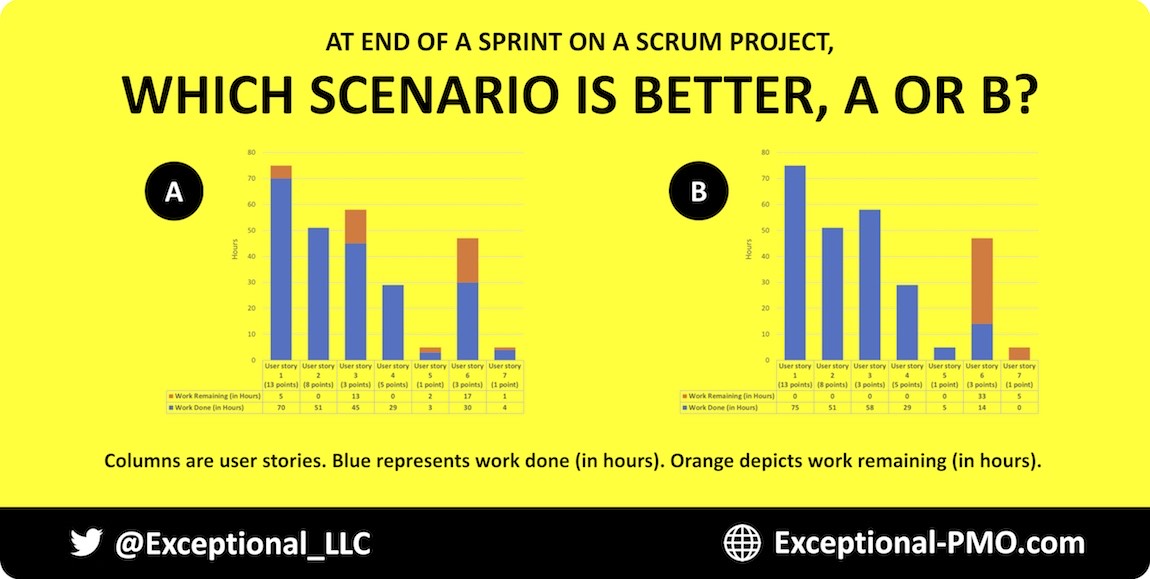
Take a look at the results at the end of a sprint on a Scrum project. There are two scenarios. Both have the same user stories with the same story points for each:
- User story 1: 13 story points
- User story 2: 8 story points
- User story 3: 3 story points
- User story 4: 5 story points
- User story 5: 1 story point
- User story 6: 3 story points
- User story 7: 1 story point

Scenario A

Here are some details on A:
- User story 1: 70 hours of work performed, 5 hours of work remaining
- User story 2: 51 hours of work performed, no work remaining (and it meets the Definition of Done [DoD])
- User story 3: 45 hours of work performed, 13 hours of work remaining
- User story 4: 29 hours of work performed, no work remaining (and it meets the DoD)
- User story 5: 3 hours of work performed, 2 hours of work remaining
- User story 6: 30 hours of work performed, 17 hours of work remaining
- User story 7: 4 hours of work performed, 1 hour of work remaining
A is summarized as:
- 232 hours of work was performed, and 38 hours of work remains
- 2 user stories were done, and 5 user stories were not completed

Scenario B
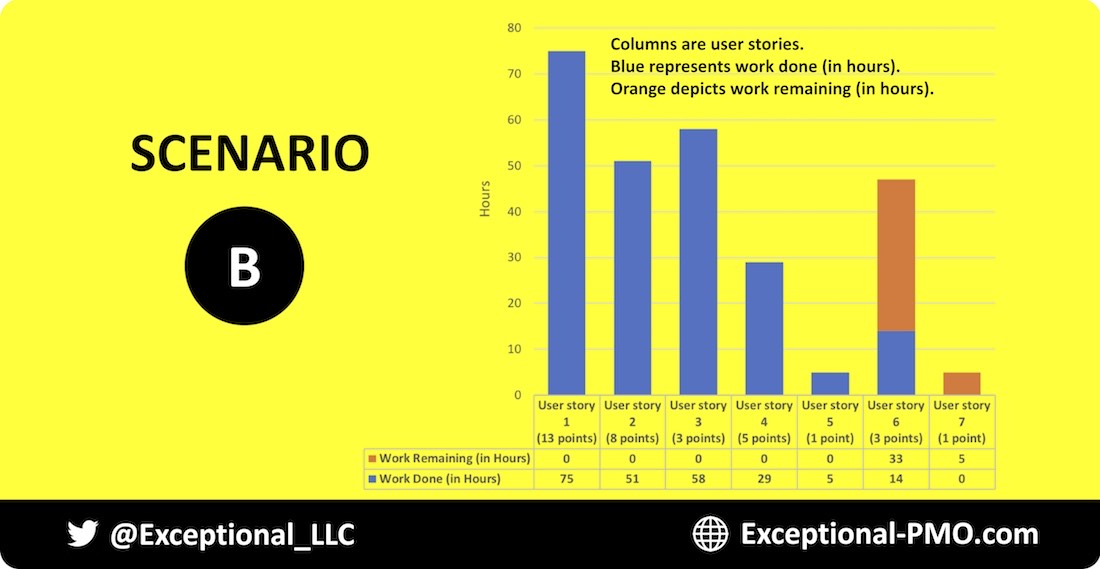
Here are some details on B:
- User story 1: 75 hours of work performed, no work remaining (and it meets the DoD)
- User story 2: 51 hours of work performed, no work remaining (and it meets the DoD)
- User story 3: 58 hours of work performed, no work remaining (and it meets the DoD)
- User story 4: 29 hours of work performed, no work remaining (and it meets the DoD)
- User story 5: 5 hours of work performed, no work remaining (and it meets the DoD)
- User story 6: 14 hours of work performed, 33 hours of work remaining
- User story 5: no work performed, and five hours of work remaining
B is summarized as:
- 232 hours of work was performed, and 38 hours of work remains
- 5 user stories were done, and 2 user stories were not completed

What Counts
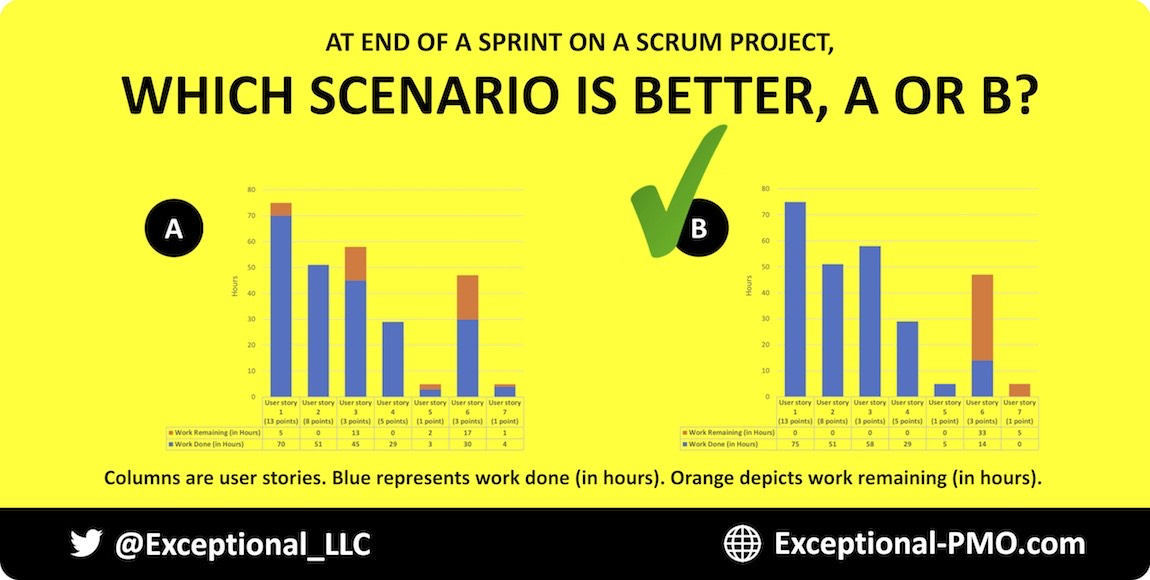
Scrum requires teams to build an increment of functionality during every sprint. Only work meeting the Definition of Done (DoD) is counted as complete, demonstrated at the sprint review meeting, and is potentially shippable.
There were two scenarios. Both had the same user stories with the same story points for each, and the same amount of work hours performed. Yet the outcomes were dramatically different. In A, 2 user stories were done--and are to be demonstrated at the sprint review meeting, and are potentially shippable. In B, 5 user stories were done--and are to be demonstrated at the sprint review meeting, and are potentially shippable. B is the better scenario.
A possible explanation for the differences between the two situations is that the Scrum team in B may have done a better job of limiting Work in Progress.

About Agile Scrum: Your Quick Start Guide with Step-by-Step Instructions
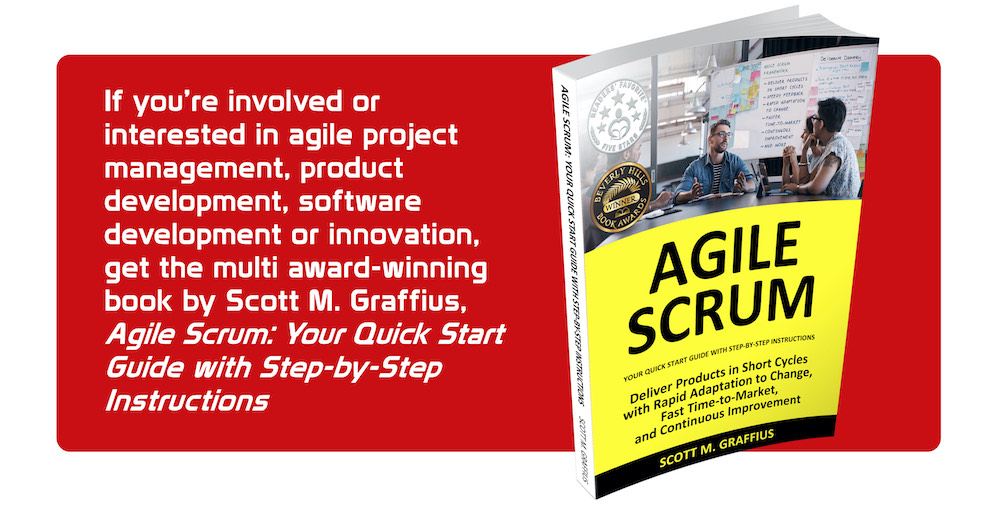
A fantastic agile transformation experience and result with a client organization in the entertainment industry was the inspiration for Scott M. Graffius’s multi award-winning book, Agile Scrum: Your Quick Start Guide with Step-by-Step Instructions (ISBN-13: 978-1533370242).
Here's an excerpt from the book: "Shifting customer needs are common in today's marketplace. Businesses must be adaptive and responsive to change while delivering an exceptional customer experience to be competitive. Traditional development and delivery frameworks such as waterfall are often ineffective. In contrast, Scrum is a value-driven agile approach which incorporates adjustments based on regular and repeated customer and stakeholder feedback. And Scrum’s built-in rapid response to change leads to substantial benefits such as fast time-to-market, higher satisfaction, and continuous improvement—which supports innovation and drives competitive advantage."
With clear and easy to follow instructions, Agile Scrum: Your Quick Start Guide with Step-by-Step Instructions helps you:
- Implement and use the most popular agile framework―Scrum;
- Deliver products in short cycles with rapid adaptation to change, fast time-to-market, and continuous improvement; and
- Support innovation and drive competitive advantage.
Hailed by Literary Titan as “the book highlights the versatility of Scrum beautifully.”
Winner of 17 first place awards.
Agile Scrum: Your Quick Start Guide with Step-by-Step Instructions is available in paperback and ebook/Kindle in the United States and around the world. Some links by country follow. Get your copy today!
- 🇦🇺 Australia
- 🇦🇹 Austria
- 🇧🇪 Belgium
- 🇧🇷 Brazil
- 🇨🇦 Canada
- 🇨🇿 Czech Republic
- 🇩🇰 Denmark
- 🇫🇮 Finland
- 🇫🇷 France
- 🇩🇪 Germany
- 🇬🇷 Greece
- 🇭🇺 Hungary
- 🇮🇳 India
- 🇮🇪 Ireland
- 🇮🇱 Israel
- 🇮🇹 Italy
- 🇯🇵 Japan
- 🇱🇺 Luxembourg
- 🇲🇽 Mexico
- 🇳🇱 Netherlands
- 🇳🇿 New Zealand
- 🇳🇴 Norway
- 🇪🇸 Spain
- 🇸🇪 Sweden
- 🇨🇭 Switzerland
- 🇦🇪 UAE
- 🇬🇧 United Kingdom
- 🇺🇸 United States
- 🌏 More countries

Let's Connect
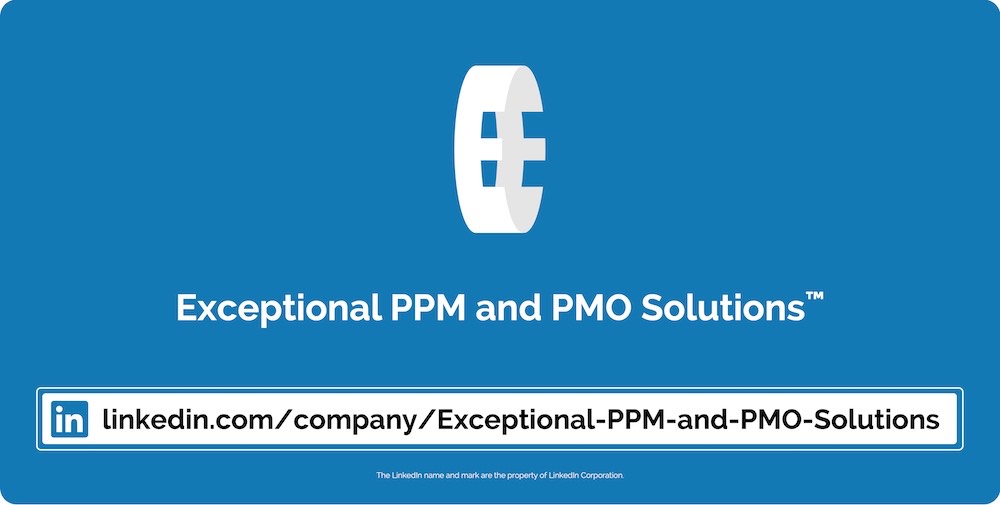
Connect with us on LinkedIn, Twitter, and Facebook.

© Copyright 2018 Scott M. Graffius, Exceptional PPM and PMO Solutions™. All rights reserved. This material may not be published, broadcast, rewritten or redistributed without the express written permission of Scott M. Graffius/Exceptional PPM and PMO Solutions™.
